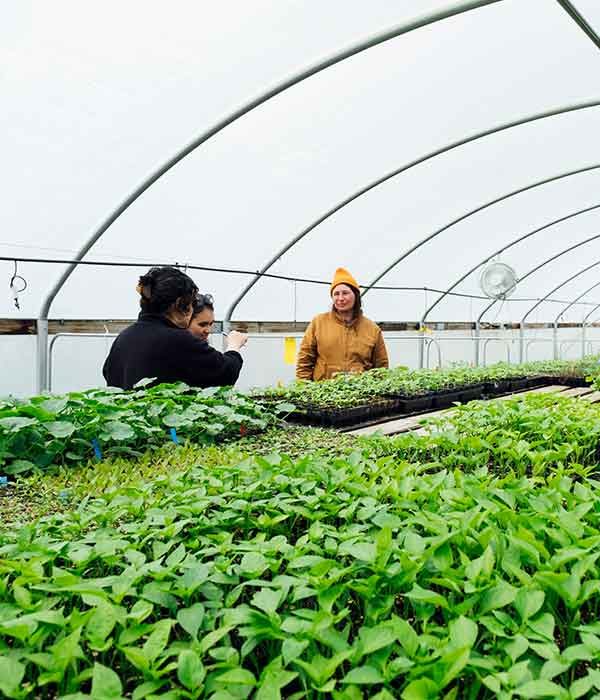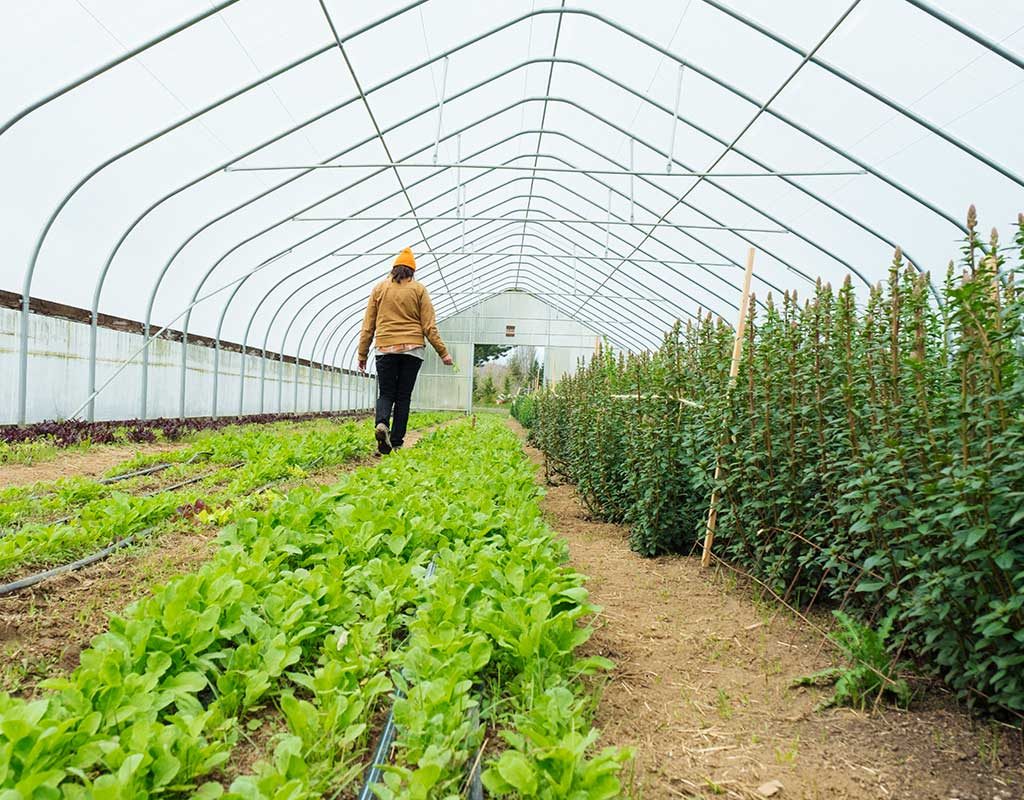
Vice President, Organizational and Food Systems Equity
Aerial view of friends gathered to harvest radishes at black futures farm in Portland, OR. Photo credit: Robert Cuadra
A $1.5M cooperative agreement will support utilization of USDA programs among farmers historically underserved or discriminated against by the agency. Ecotrust is among the organizations who will be leading this work in the Portland Metro region.
The United States Department of Agriculture (USDA) is investing $1.5 million from its Urban and Innovative Agriculture Community-Based Organization Fund to support urban agriculture efforts across the Portland Metro region. Ecotrust has been selected to lead these efforts.
With this investment, Portland will be home to one of 17 new urban agriculture centers nationwide.
Through a multiyear effort, we will work to improve the utilization of USDA programs and services among urban farmers who’ve been historically underserved or discriminated against by the USDA.
The Portland Metro region is a leader in the state when it comes to small, diversified farm production. The region’s 9,632 farms encompass 1,005,357 acres in farmland, with a value of just over $1 billion in annual total agricultural products sold. Accessing USDA programs and services is critical when it comes to the continued growth and resilience of our regional food economy. These programs provide foundational resources for farmers seeking to acquire land and establish successful agricultural businesses.

Happy hands! Sabrina Cerquera, Ecotrust Food Systems Equity Program Manager, digs in at black futures farm. Photo credit: Robert Cuadra

Community partners talk about growth cycles with farmer Michelle Week, founder of Good Rain Farm, at the Headwaters Incubator Program in Gresham, OR. Photo credit: Kari Rowe
Yet, farmers who are Black, Latine, Indigenous, Asian, Pacific Islander, women, and immigrant, young, new, or beginning have disproportionately encountered barriers to accessing critical USDA funding and resources needed to adequately support their agricultural operations. Racial and other forms of discrimination at USDA in program access and delivery have been extensively documented through congressional reports, USDA studies, and court actions going back to the 1960s. An NPR analysis looking at 2022 data from the USDA Farm Service Agency (FSA) showed the agency granted only 36 percent of Black farmer direct loan applications, compared to the 72 percent approval rate for white farmer direct loan applications. The disparate access to USDA programs and services has resulted in cumulative impacts that limit farm size, wealth accumulation, and quality of life for farmers of color.
In early 2023, a new USDA Equity Commission recommended “sweeping and generational change that must not only interrupt the perpetuation of discriminatory systems but reconstruct the way USDA operates at all levels moving forward, to create an equitable and inclusive future.” The report continued, “The vision is that USDA cannot fulfill its mission without delivering equitable service. Equity … is about ensuring all USDA customers receive equitable treatment and support needed to operate sustainable, efficient, and productive operations.”
Recognizing the legacy of historical and ongoing discrimination, in 2022 Congress authorized the USDA Discrimination Financial Assistance Program through Section 22007 of the Inflation Reduction Act. From July through the end of October of this year, the USDA is accepting applications for financial relief for farmers, ranchers, and forest landowners, who faced discrimination from the agency before 2021. A total of 2.2 billion dollars in restitution is available.

Farmer Michelle Week examines the greenhouse operations of Good Rain Farm, located at the Headwaters Incubator Program in Gresham, OR. Photo credit: Kari Rowe
The obstacles experienced by Black and brown producers are decades, and in some cases, centuries in the making. We recognize that it’s going to take time and effort to rebuild relationships and change outcomes. We will begin our efforts through outreach, education and technical assistance, including building awareness about the new Urban Service Center in Clackamas County, which will be staffed by FSA and Natural Resources Conservation Service employees. The new Urban Service Center will offer farm loan, conservation, disaster assistance, and risk management programs.
Producers need targeted, focused, and intentional outreach, education, and support, including community-led, community-centered, and culturally appropriate solutions that will support their involvement and engagement in FSA and other USDA programs and services, as well as meet their unique needs for growth. The FSA is particularly important as it is often the first stop for producers working with USDA. As a part of these efforts, we will also provide equity training that builds the capacity of the Oregon Farm Service Agency to serve all producers inclusively, leading to a greater number of underserved producers utilizing federal programs that support conservation practices, land access, and operations expansion. These efforts are intended to result in meaningful impact to the long-term farm viability of underserved urban producers in the Portland Metro area.
Over time, these efforts will support increased supply chain resiliency in local food systems by improving the sustainability and long-term viability of urban farms.
In addition, over the next three years, this initiative will distribute $150,000 in microgrants to urban producers to support them in adopting climate-stewardship practices that improve soil and water quality. To complement the microgrant program, our team will provide direct technical assistance and facilitate on-farm engagements that build awareness of how USDA programs can be used to support climate-stewardship farming practices. These efforts will build urban producers’ capacity to grow food, expand farming operations, and implement climate-friendly practices. Over time, these efforts will support increased supply chain resiliency in local food systems by improving the sustainability and long-term viability of urban farms.
This deeply important work is grounded in strong partnerships. Our team at Ecotrust will collaborate closely with the Black Food Sovereignty Coalition, Oregon Department of Agriculture, Oregon State University Center for Small Farms, Oregon Metro, and Multnomah County Health Department’s Racial and Ethnic Approaches to Community Health program through a long-term effort that works to ensure the agency delivers equitable service to all.

PRESS RELEASE
A $1.5M cooperative agreement will support utilization of USDA programs among farmers historically underserved or discriminated against by the agency